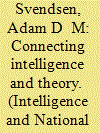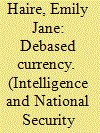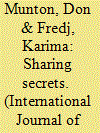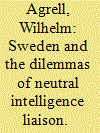| Srl | Item |
| 1 |
ID:
091756


|
|
|
|
|
| Publication |
2009.
|
| Summary/Abstract |
Intelligence liaison increased exponentially during the so-called 'War on Terror'. Today it continues as the most significant dimension of intelligence, including impacting on accountability and oversight considerations. Nevertheless, the intelligence liaison phenomenon remains largely under-studied and substantially under-theorized. In this article, preliminary suggestions are offered concerning how this dearth of theory can be addressed. Firstly, the relevance of international relations theory and other bodies of theory, together with significant approaches concerning how international relations - extending to how intelligence and intelligence-related phenomena (such as, in this article, intelligence co-operation) - can be studied, are explored. These theories, and equally, approaches, are arguably most appropriate when deployed in an arrangement of 'complex co-existence plurality' across the different interrelated levels of experience and analysis, and they offer more effective explanations when intelligence liaison is disaggregated into at least eight systemic attributes or variables. More broadly, the suggestion that international relations theory, and indeed theory generally, is 'irrelevant' to intelligence studies is simultaneously challenged.
|
|
|
|
|
|
|
|
|
|
|
|
|
|
|
|
| 2 |
ID:
133420


|
|
|
|
|
| Publication |
2014.
|
| Summary/Abstract |
Using memoirs can be a vital way of supplementing archival evidence or indeed of overcoming a shortage of contemporaneous sources, and they offer insights into the attitudes and motivations of participants as well as how they recorded and remembered events. Memoirs retain an inherent value that must not be ignored, particularly in the study of intelligence liaison which addresses the kinds of personal and cultural aspects which are often especially well illuminated through autobiographical writing. This paper explores some of the theoretical and practical issues associated with the use of memoir material and examines them through the prism of selected autobiographical writings related to Anglo-French intelligence liaison from the Great War up to the Second World War.
|
|
|
|
|
|
|
|
|
|
|
|
|
|
|
|
| 3 |
ID:
124000


|
|
|
|
|
| Publication |
2013.
|
| Summary/Abstract |
During the lead-up to the 2003 invasion of Iraq, the governments of the United States and United Kingdom jointly made public a range of previously secret intelligence to bolster claims that Saddam Hussein's regime had continued to pursue development of weapons of mass destruction. Public releases of intelligence information are less rare than often assumed, but the Iraq case was definitely unusual in that both governments implicitly revealed their close cooperation.
|
|
|
|
|
|
|
|
|
|
|
|
|
|
|
|
| 4 |
ID:
073526


|
|
|
|
|
| Publication |
2006.
|
| Summary/Abstract |
Throughout the Cold War Sweden pursued a declared policy of non-alignment. Sweden nevertheless established security links with a number of Western powers, first of all Britain and the US. The most extensive links were developed in two areas - military technology and intelligence. Intelligence liaison was of crucial importance for the security of non-aligned Sweden, but also significant for the major Western powers in filling gaps in intelligence collection. But intelligence liaison also served as an instrument in a closed policy arena where Sweden could receive or pay back favours, according to a pattern established already during World War II. However, intelligence liaison contained policy dilemmas, some of a more general nature, some specific for a country with an overt policy of non-alignment.
|
|
|
|
|
|
|
|
|
|
|
|
|
|
|
|